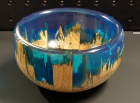I’ve been casting resin for years mostly for pen turning. In my opinion all of them have their use or strong point. Sometimes it’s worth spending a little more money to get a resin that will work the best for the job at hand and not give complications along the way.
Alumilite (urathane resin) is great when mixing colors and keeping good color separation. It also adheres well to natural material like wood and pine cones. Another advantage, no odor, very durable, quicker curing time and no shrinkage. It’s drawback is moisture and not ideal for multiple pours over itself. It also needs to cure under pressure.
Polyester Resin (PR) aka Silmar 41 works well for clear casting. It’s probably the most affordable. It’s has a very long working time and is great for multi layers, as it adheres very well to itself. It’s drawbacks are it’s strong odor, it shrinks in curing and can take 8-12 hours to cure. It doesn’t need to be under pressure but cures better that way. It is also more brittle than most but can be made less brittle by only adding 2-3 drops of hardner per ounce instead of the 7-10 as states on the label. It can be used with colorants and dyes but needs to thicken prior to pouring.
There are several epoxy resins on the market. I’ve used a few and have come to the same opinion. It’s great for adhering to objects but I’m not a fan. It takes the longest time to cure and still comes out of the mold flexible. I’ve had it stay flexible for a couple days. The other issue is over time all epoxy resins will turn yellow so it’s not ideal for clear or light color casts.
these are just my opinions and I would suggest you try them all and see what works best for you and your application. There is a learning curve with them all. Any moisture content in your objects being cast will be a concern with all resins. I would suggest buying your resin from a resin company. Shelf life at a hobby store is unknown and resin freshness can effect the brittleness and it’s success. Also, Keeps lots of notes so you can be consistent.
good luck

